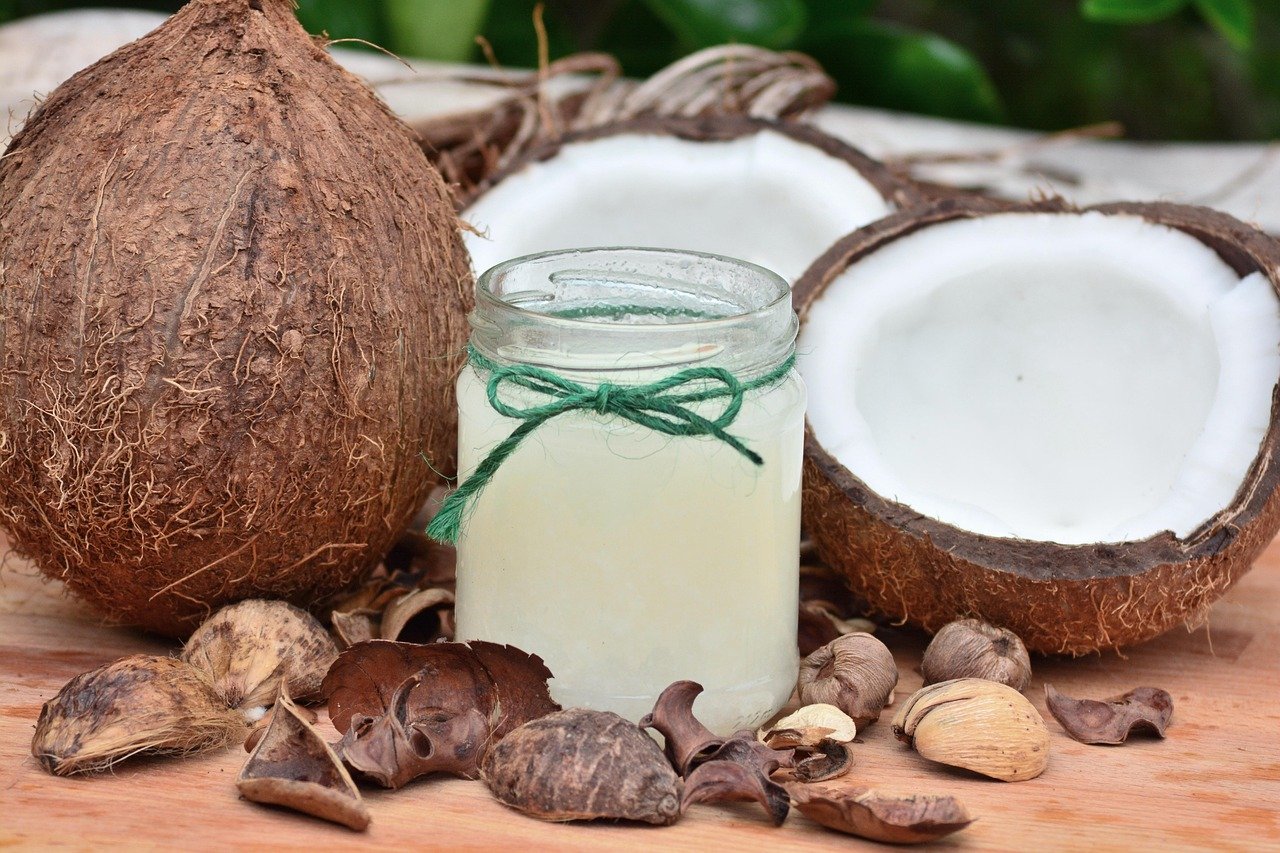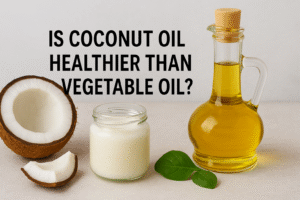Is Coconut Oil Healthier Than Vegetable Oil? A Complete Comparison for Cooking and Health
Is Coconut Oil Healthier Than Vegetable Oil?
The debate over which cooking oil is healthier—coconut oil or vegetable oil—has been ongoing for years. Is Coconut oil healthier than vegetable oil ? With so many options on grocery store shelves, choosing the right oil for your health, cooking style, and taste preferences can be confusing. This article provides an unbiased, well-researched comparison to help you make an informed decision.
Understanding Coconut Oil
Producers extract coconut oil from the meat of mature coconuts.
This oil primarily contains saturated fats, including medium-chain triglycerides (MCTs), which quickly convert into energy and may offer metabolic benefits.
What is Vegetable Oil?
Vegetable oil is a broad term for oils derived from plants, often a blend of soybean, corn, canola, sunflower, or other seed oils. Vegetable oil is commonly refined to create a neutral-tasting. Versatile product ideal for frying, sautéing, and baking.
Vegetable oils generally contain higher amounts of unsaturated fats, especially polyunsaturated and monounsaturated fats, which are considered heart-healthy by many health organizations.
Nutritional Breakdown: Coconut Oil vs. Vegetable Oil
Coconut oil is high in saturated fats—about 90% of its total fat content—which is significantly higher than most vegetable oils. The predominant fat, lauric acid, is known to raise both HDL (“good”) and LDL (“bad”) cholesterol levels.
Vegetable oils typically contain a mix of monounsaturated and polyunsaturated fats. Depending on the type, they may offer essential omega-3 and omega-6 fatty acids, which play crucial roles in brain and heart health.

Smoke Point and Cooking Performance
The smoke point indicates the temperature at which an oil starts to break down and release harmful compounds. Coconut oil has a moderate smoke point of around 350°F (177°C), making it suitable for baking, sautéing, and light frying.
Vegetable oils vary in smoke point, with some like canola oil and sunflower oil reaching up to 450°F (232°C). This makes them ideal for deep-frying and high-heat cooking.
Flavor Profile and Culinary Uses
Coconut oil offers a mild coconut flavor, which works well in certain baked goods, tropical recipes, and even coffee for those seeking a richer texture.
Vegetable oils are neutral in flavor, making them ideal for dishes where you don’t want the oil to influence the taste—such as salad dressings, sautés, and frying.
Health Benefits of Coconut Oil
Coconut oil contains medium-chain triglycerides (MCTs) that are rapidly absorbed and used for energy. Some studies suggest MCTs may aid weight management and boost metabolism.
Additionally, coconut oil’s lauric acid has antimicrobial properties, which may help protect against certain bacteria, viruses, and fungi.
Health Benefits of Vegetable Oil
Vegetable oils, particularly olive, canola, and sunflower oils, are rich in heart-healthy unsaturated fats. Consuming these fats in moderation can help lower LDL cholesterol and reduce the risk of heart disease.
Certain vegetable oils provide essential fatty acids, like omega-3 and omega-6, which support brain function and hormonal balance.
Potential Health Risks of Coconut Oil
Despite its benefits, coconut oil’s high saturated fat content raises concerns about increased LDL cholesterol and potential heart disease risk, especially when consumed excessively.
Health authorities, such as the American Heart Association, recommend limiting saturated fat intake and favoring unsaturated fats for cardiovascular health.
Potential Health Risks of Vegetable Oil
Highly refined vegetable oils can contain trans fats, which are linked to inflammation, heart disease, and other health issues. Choosing minimally processed oils helps avoid these risks.
Overheating vegetable oils beyond their smoke point can generate harmful free radicals, so proper cooking practices are essential.
Is Coconut Oil Good for Weight Loss?
Some proponents claim that coconut oil supports weight loss due to its MCT content. MCTs may increase satiety and fat burning, although research on long-term effects remains inconclusive.
Incorporating coconut oil as part of a balanced diet may offer modest metabolic benefits, but it is not a magic solution for weight management.
Is Vegetable Oil Good for Heart Health?
Many vegetable oils, especially olive and canola oil, are considered heart-healthy due to their unsaturated fat content. These fats can help lower bad cholesterol and improve cardiovascular markers.
However, oils like soybean and corn oil are high in omega-6 fatty acids, which may promote inflammation if consumed excessively without balancing omega-3 intake.
Environmental Impact: Coconut Oil vs. Vegetable Oil
Coconut oil production requires fewer resources and produces less greenhouse gas compared to some vegetable oils. However, increasing global demand raises concerns about deforestation and biodiversity loss in tropical regions.
Vegetable oil production, particularly palm, soybean, and corn oils, has been linked to deforestation, habitat destruction, and large-scale monoculture farming practices, impacting environmental sustainability.
Cost and Accessibility
Coconut oil tends to be more expensive than common vegetable oils, partly due to its specialized production process and imported status in many countries.
Vegetable oils, especially blended varieties, are widely available, affordable, and versatile, making them a staple in households worldwide.

When to Choose Coconut Oil
Opt for coconut oil if you:
- Enjoy mild coconut flavor in baked goods or sautéed dishes
- Need a stable oil for moderate-heat cooking
- Use oil for skin, hair, or cosmetic purposes
- Seek quick energy from MCTs for workouts or fasting protocols
When to Choose Vegetable Oil
Choose vegetable oil if you:
- Prefer a neutral-tasting oil for cooking and baking
- Need high-heat cooking options like deep-frying
- Follow a heart-healthy diet emphasizing unsaturated fats
- Look for affordable, widely available cooking oils
Summary: Which Oil is Healthier?
The healthiest oil depends on your individual needs. Coconut oil offers unique benefits like MCTs and antimicrobial properties but is high in saturated fat. Vegetable oils vary in composition but generally provide more heart-friendly unsaturated fats.
For heart health, minimally processed vegetable oils like olive or canola oil are recommended. For moderate-heat cooking, baking, and natural personal care, coconut oil can be a beneficial addition.
FAQs About Coconut Oil and Vegetable Oil
Does coconut oil raise cholesterol?
Yes, it can raise both HDL (good) and LDL (bad) cholesterol levels.
Can coconut oil replace vegetable oil in recipes?
In many baking or sautéing recipes, yes, though it adds a coconut flavor.
Which oil is better for frying?
High-smoke-point vegetable oils like canola or sunflower oil are better for frying.
Is coconut oil keto-friendly?
Yes, due to its MCT content, coconut oil is popular in ketogenic diets.
Are all vegetable oils healthy?
Not all. Opt for unrefined, cold-pressed oils and avoid hydrogenated oils with trans fats.
Final Thoughts and Recommendations
Both coconut oil and vegetable oil have their place in a healthy diet when used appropriately. Variety and moderation are key to optimizing health benefits and minimizing risks.
Actionable Tips:
- Use virgin coconut oil for baking or light sautéing.
- Opt for olive, avocado, or canola oil for heart health.
- Avoid overheating oils to prevent harmful compounds.
- Read labels to avoid trans fats and excessive processing.
Consult a healthcare provider or nutritionist to personalize your dietary choices based on health conditions and lifestyle.

